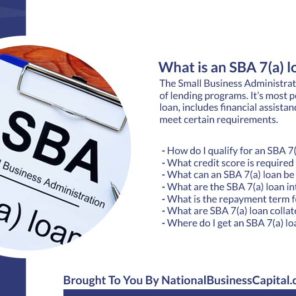Table of contents
The Small Business Administration (SBA) offers a variety of lending programs. Its most popular program, the SBA 7(a) loan, includes financial assistance for small businesses that meet certain requirements.
The SBA 7(a) loan is partially government-backed. This means the government agrees to cover a portion of the loan amount in case borrowers default. This guarantee provides lenders with additional security, which in turn, translates to lower interest rates for you.
The maximum funding amount for SBA 7(a) loans is $15 Million, and funds may be used for operational expenses, real estate purchases, equipment purchases, or even debt refinancing. The SBA 7(a) loan features some of the lowest interest rates on the market, with repayment periods ranging between 10 to 25 years.
The SBA 7(a) loan can be a great financing solution for small businesses, however, not every business will qualify. The SBA maintains very strict eligibility requirements.
What Is an SBA 7(a) Loan?
The SBA’s 7(a) loan program provides small businesses with funding for almost any business purpose, with some specialized restrictions. Funding amounts are capped at $15 Million, and repayment can extend up to 25 years.
SBA loans carry some of the lowest interest rates available, making them one of the most popular financing solutions on the market. Entrepreneurs commonly use them for working capital, equipment purchases, construction/renovation, purchasing new businesses entirely, and refinancing existing debt.
Most 7(a) loans come with fixed interest rates and monthly payments. Although eligibility requirements are tight, this type of financing is something that any entrepreneur should consider as they plan to grow their business.
How Does a SBA 7(a) Loan Work?
SBA loans are offered by SBA-sponsored lenders, which vary from location to location. Once you’ve found one in your area, you’ll review the eligibility requirements, fill out an application, and submit it for processing.
If you qualify, you’ll receive an approval letter outlining the terms you qualify for. Review all of the language and make sure that the offered terms align with your goals, then make a decision on whether or not you’ll accept the offer.
Like other forms of financing, there’s room for negotiation. You can potentially make minor changes to your terms that fit better with your business plan, but remember you’ll need evidence to back up your claims. For example, if you’re offered repayment terms that don’t fit your opportunity, there’s a chance that speaking with your lender about the discrepancy will improve your terms to best suit your business plan.
Keep in mind: The SBA underwriting process is notoriously lengthy, and some applicants who don’t proactively check the eligibility requirements can spend 6+ weeks waiting only to receive a denial. It’s important to make sure you check all the boxes, including the specialized requirements, to move through the process as fast as possible.
What Are the Benefits of a SBA 7(a) Loan?
SBA 7(a) loans are some of the most coveted financing options available because of the many benefits they offer to growing businesses. Here are a few of the most notable benefits.
- Low interest rates
- High funding amounts
- Flexible repayment options
- Fixed (or variable) interest rates
- Ability to use the funds for almost any business purpose
- Minimal down payments
Unlike the SBA’s other loan programs, 7(a) loans can be used for various business purposes, allowing entrepreneurs immense flexibility in implementing their growth plans.
What Credit Score Is Required for an SBA 7(a) Loan?
For the best approval odds, you’ll need to have solid personal and business credit scores. The SBA emphasizes strong credit and may analyze personal credit score data for multiple owners (with 20% shares or more).
The SBA uses the FICO® Small Business Scoring ServiceSM Score (SBSS Score) for SBA 7(a) loan applications. The FICO SBSS is a business credit score that can analyze personal credit data, business credit, as well as other financial information. The FICO SBSS maintains a score range of 0 to 300, and anything below 155 may hinder approval.
Additionally, SBA lenders may have their own personal credit score requirements. If you’re considering working with a bank or a credit union, personal and business credit scores should be at least 700. However, fintech lenders and online lenders offer more flexibility.
What Can an SBA 7(a) Loan be Used for?
SBA 7(a) loans are working capital loans that can be put towards a variety of business functions.
You can use the funds for:
- Inventory, supplies, and raw material purchases
- Operational expenses
- Expansion projects, entailing hiring new staff, advertising, start-up costs, etc.
- Debt refinancing
- Real estate or vacant land purchases
- Real estate renovations
- Certain business acquisitions
An SBA 7(a) loan cannot be used to finance:
- Business expenses in the following industries: speculation, lending, investment, rental real estate, gambling, and nonprofit
- Delinquent tax payments
- Relocations that will result in net job losses
- Rental property purchases where your business doesn’t occupy at least 51% of the space in an existing property or 60% of the space in a new construction.






